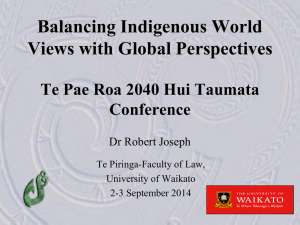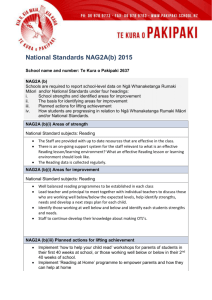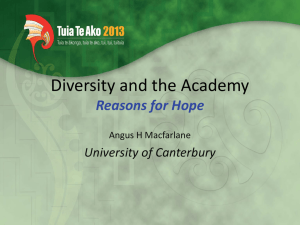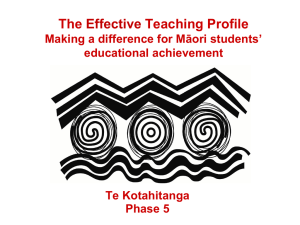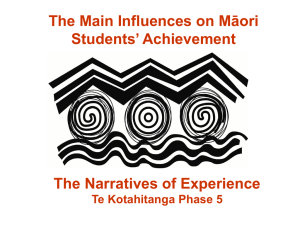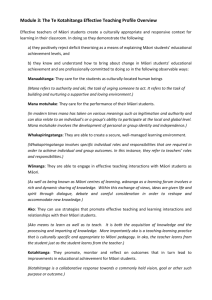Bachelor of Social Work - University of Canterbury
advertisement
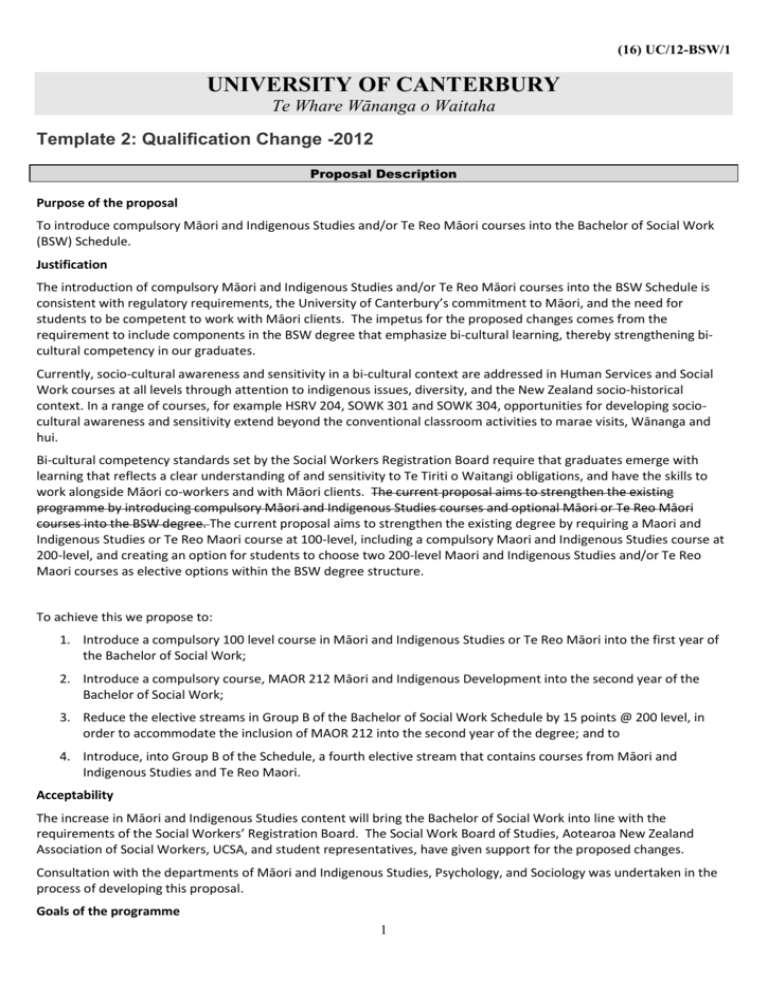
(16) UC/12-BSW/1 UNIVERSITY OF CANTERBURY Te Whare Wānanga o Waitaha Template 2: Qualification Change -2012 Proposal Description R Purpose of the proposal To introduce compulsory Māori and Indigenous Studies and/or Te Reo Māori courses into the Bachelor of Social Work (BSW) Schedule. Justification The introduction of compulsory Māori and Indigenous Studies and/or Te Reo Māori courses into the BSW Schedule is consistent with regulatory requirements, the University of Canterbury’s commitment to Māori, and the need for students to be competent to work with Māori clients. The impetus for the proposed changes comes from the requirement to include components in the BSW degree that emphasize bi-cultural learning, thereby strengthening bicultural competency in our graduates. Currently, socio-cultural awareness and sensitivity in a bi-cultural context are addressed in Human Services and Social Work courses at all levels through attention to indigenous issues, diversity, and the New Zealand socio-historical context. In a range of courses, for example HSRV 204, SOWK 301 and SOWK 304, opportunities for developing sociocultural awareness and sensitivity extend beyond the conventional classroom activities to marae visits, Wānanga and hui. Bi-cultural competency standards set by the Social Workers Registration Board require that graduates emerge with learning that reflects a clear understanding of and sensitivity to Te Tiriti o Waitangi obligations, and have the skills to work alongside Māori co-workers and with Māori clients. The current proposal aims to strengthen the existing programme by introducing compulsory Māori and Indigenous Studies courses and optional Māori or Te Reo Māori courses into the BSW degree. The current proposal aims to strengthen the existing degree by requiring a Maori and Indigenous Studies or Te Reo Maori course at 100-level, including a compulsory Maori and Indigenous Studies course at 200-level, and creating an option for students to choose two 200-level Maori and Indigenous Studies and/or Te Reo Maori courses as elective options within the BSW degree structure. To achieve this we propose to: 1. Introduce a compulsory 100 level course in Māori and Indigenous Studies or Te Reo Māori into the first year of the Bachelor of Social Work; 2. Introduce a compulsory course, MAOR 212 Māori and Indigenous Development into the second year of the Bachelor of Social Work; 3. Reduce the elective streams in Group B of the Bachelor of Social Work Schedule by 15 points @ 200 level, in order to accommodate the inclusion of MAOR 212 into the second year of the degree; and to 4. Introduce, into Group B of the Schedule, a fourth elective stream that contains courses from Māori and Indigenous Studies and Te Reo Maori. Acceptability The increase in Māori and Indigenous Studies content will bring the Bachelor of Social Work into line with the requirements of the Social Workers’ Registration Board. The Social Work Board of Studies, Aotearoa New Zealand Association of Social Workers, UCSA, and student representatives, have given support for the proposed changes. Consultation with the departments of Māori and Indigenous Studies, Psychology, and Sociology was undertaken in the process of developing this proposal. Goals of the programme 1 (16) UC/12-BSW/1 The BSW degree provides students with the opportunity to attain a high standard of scholastic achievement in social work related subjects in addition to establishing their basic social work practice skills. The programme is a combination of research, theory, practice, and policy courses together with fieldwork placements in social work agencies. This gives students a grounded knowledge and the ability to work with the complexity and uncertainty of contemporary professional practice. The emphasis on independent scholarship and analytic enquiry in the final year of the degree will assist those students with a desire to move into higher level professional positions or undertake postgraduate research study. The objectives of the BSW degree programme are: To provide students with integrated theoretical and skills-based learning experiences that enable them to work reflectively and confidently in a variety of social work settings (including research, practice, policy, and education); To prepare students for professional social work practice with an enhanced capacity for problem solving and a range of clinical skills; To equip students to initiate and undertake social science research projects that contribute to knowledge of social work theory and practice; To develop a critical appreciation of discrimination and structural inequalities in society, particularly as they impact on Māori and Pacific peoples and be able to translate that into action; To promote professional and intellectual rigour in students’ analysis of policy processes and in their decisionmaking related to practice. The changes in this proposal will assist students to develop the skills required in the penultimate bullet point: to develop a critical appreciation of discrimination and structural inequalities in society, particularly as they impact on Māori and Pacific peoples and be able to translate that into action. Graduate profile By the time that students graduate from the programme, they will have developed the following learning outcomes and skills that relate to social work at macro and micro levels: Learning Outcomes o Sound knowledge of social work theory, processes, ethics and values that inform reflective practice o Critical appreciation of discrimination and structural inequalities in society, particularly as they impact on Māori and Pacific peoples; o Understanding of issues around biculturalism and of obligations under the Treaty of Waitangi; o Awareness of knowledge of cultural perspectives that determine and influence the behaviour of social workers and those they assist; o Commitment to alleviating social disadvantage and to addressing contemporary social issues in New Zealand society; o Basic knowledge of legal processes, including a familiarity with laws affecting social work fields of practice; o Knowledge of social policy and the organisation of national and local social services that have been established in response to changing social needs; o Familiarity with major areas of mental disorder and the impact of these on the individual, family and society; o An integrated understanding of human development within biological, psychological, social and cultural contexts; o Awareness and knowledge of social work within statutory and non-statutory contexts, and an understanding of the differing requirements of each. Skills o An ability to work appropriately with individuals and their families or whanau from diverse age, gender and cultural backgrounds; o Skills in social science research methods, including their ethical application and use in social work practice; o Skills in assessment and interventions, whether with individuals, families, groups or in community settings; o Ability to analyse policy processes as they relate to social service provision and delivery in New Zealand; 2 (16) UC/12-BSW/1 o Capable or making connections between theoretical and empirical dimensions of social policy and their effect on social work agencies and practice. The changes in this proposal will ensure that graduates have an understanding of issues around biculturalism and of obligations under the Treaty of Waitangi, have an awareness of cultural perspectives that determine and influence the behaviour of social workers and those they assist, and have the skills to work appropriately with individuals and their families or whanau from diverse cultural backgrounds. Outcome statement A University of Canterbury Bachelor of Social Work can be awarded with Honours, and, being a four-year degree, is internationally recognised. It opens the door to exciting local and global career options in government, not-for-profit and private agencies. Prominent fields of practice include welfare, health and mental health, criminal justice, education, community development, policy analysis and social research. Students graduating from the BSW programme will have developed their knowledge of social policy and the organisation of national and local social services, their appreciation of discrimination and structural inequalities in society, and their proven ability to work appropriately in the practice situations experienced during their two years in the limited entry programme. Programme overview In the first year of study in the BSW a candidate takes compulsory courses in Social Work and courses from one of four elective areas- Human Services, Sociology, Psychology or Māori and Indigenous Studies/Te Reo. Year Two includes further SOWK courses and the completion of the chosen elective. Entry to Year Three and above is limited entry and comprises SOWK courses. Year Four includes two research based internships and a further research project course. Each year is 120 points and the degree can be awarded with Honours. SOWK 100 and 200 level courses are on the BA schedule and can be credited to a BA if a candidate chooses not to complete the BSW. Proposed teaching/delivery methods Lectures, tutorials, workshops, marae visits, hui, wananga etc as specified in the existing Māori and Indigenous Studies or Te Reo Maori courses. Assessment procedures These are as appropriate to the existing Māori and Indigenous Studies or Te Reo Maori courses and include examinations, tests including oral in-class tests, essays and learning journals. Predicted student numbers/EFTS No change. Approximate numbers of students enrolled in the BSW are as follows: 100-level 80-100 students 200-level 50 students 300-level 40 students 400-level 40 students Resources There are no additional staffing requirements for the Department of Human Services and Social Work. Human Services, Sociology, and Psychology would lose approximately 1 EFT each across 200-level courses as a consequence of these changes. Enrolments in existing Aotahi courses will increase and additional resources may be required to support the delivery of these courses to a larger number of students. It is estimated that the requirement for a compulsory 100 level courses in either Māori and Indigenous Studies or Te Reo will add 80-100 enrolments across the 100-level offerings from Aotahi, that the requirement for MAOR 212 will add a further 50 students to the enrolments in that course, and that the addition of a fourth elective stream is likely to generate a slight increase in enrolments across the courses in the Māori and Indigenous Studies and Te Reo progammes. Aotahi have undertaken to offer MAOR 212 each year. Plans for monitoring programme quality The programme will be subject to regular quality evaluation through internal Departmental and University of Canterbury monitoring procedures, and external review. The programme is also subject to regular review by the Social Workers Registration Board. Student surveys of course content and teaching are also carried out routinely. 3 (16) UC/12-BSW/1 Consultation with members of the social work profession is an important aspect of monitoring the quality of the education provided at UC. The Department has processes already in place whereby honorary fieldwork-staff contribute to policy and planning including, but not limited to the Social Work Board of Studies. Proposed new regulations and prescriptions (use the Calendar Form as follows) Calendar Form New Qualification Regulations UC Calendar 2012 Page 247 The Degree of Bachelor of Social Work (BSW) DELETE: REGULATION 2 Structure of the Degree ADD 2. Structure of the Degree To qualify for the Degree of Bachelor of Social Work a candidate must pass courses which shall be selected from the Schedule to these regulations and have a minimum total value of 480 points comprising: (a) 405 points from Group A of the Schedule, (b) 75 points from Group B of the Schedule. These regulations took effect from 1 January 2013. A candidate who enrolled for the Bachelor of Social Work before 1 January 2013 may complete under the regulations in the 2012 Calendar, providing they complete their course of study before 31 December 2015. Candidates may apply to the Dean of Humanities and Social Sciences for such variation as the Dean may determine. UC Calendar 2012 Page 246 ADD: 2. Transition Rules for Students who enrolled for the Bachelor of Social Work before 1 January 2011 A candidate who enrolled in the Bachelor of Social Work before 1 January 2011 may complete under the regulations in the 2010 Calendar, providing they complete their course of study before 31 December 2013. Candidates may apply to the Dean of Humanities and Social Sciences for such variation as the Dean may determine. UC Calendar 2012 Page 248 Schedule to the Regulations for the Degree of Bachelor of Social Work Group A: Required courses DELETE: Students are required to select courses totalling 390 points from Group A. ADD: Students are required to select courses totalling 405 points from Group A. UC Calendar 2012 Page 248 4 (16) UC/12-BSW/1 Schedule to the Regulations for the Degree of Bachelor of Social Work Group A: Required courses: Below HSRV 103 Violence in Society ADD: A 100 level course in MAOR or TREO. UC Calendar 2012 Page 248 Schedule to the Regulations for the Degree of Bachelor of Social Work Group A: Required courses: Below HSRV 206 ADD: MAOR 212 Māori and Indigenous Development UC Calendar Page 248 DELETE Group B Elective Courses and Group C Optional courses ADD: Group B: Elective courses The following courses listed in the Schedule to the Regulations for the Degree of Bachelor of Arts, amounting to 75 points and taken either as Elective Stream 1, or as Elective Stream 2, or as Elective Stream 3, or as Elective Stream 4: Elective Stream 1 (Human Services) 45 points in Sociology or Psychology at 100-level, 30 points in Human Services at 200-level Elective Stream 2 (Sociology) 30 points in Sociology at 100-level, including SOCI 111 and 112 or their equivalents 15 points in Psychology at 100-level, including either PSYC 105 and 106 or their equivalents 30 points in Sociology at 200-level Elective Stream 3 (Psychology) 30 points in Psychology at 100-level, including PSYC 105 and 106 or their equivalents 15 points in Sociology at 100-level, including either SOCI 111 and 112 or their equivalents 30 points in Psychology at 200-level, including PSYC 206 Elective Stream 4 (Maori and Indigenous Studies/Te Reo) 30 points in Sociology at 100-level, including SOCI 111 and 112 or their equivalents 15 points in Psychology at 100-level, including either PSYC 105 and 106 or their equivalents 30 points in Māori and Indigenous Studies or Te Reo Maori at 200-level Note: Prerequisites, restrictions and limitations may apply as shown in the BA Schedule. 5
